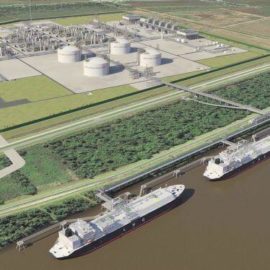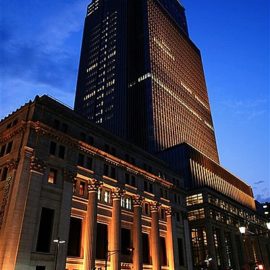
Environmentalists continue to oppose the LNG plants.
A pair of environmental justice organizations have released reports condemning the potential ecological disruption of one pending Venture Global liquefied natural gas facility in Louisiana and reported flaring and leaks at another, signaling their continued clash against the state’s proliferating LNG export industry. The first report, published by the Sierra Club, said the planned site for Plaquemines LNG in Plaquemines Parish will flood during a major hurricane and could lead to chemical runoff into surrounding areas. The second, released by the Louisiana Bucket Brigade, accused Calcasieu Pass in Cameron Parish of excessive flaring and cited accidental natural gas releases that Venture Global LNG reported to the state Department of Environmental Quality. In both reports, the environmental groups lament the role state and federal agencies are playing in regulating these facilities. DEQ spokesman Greg Langley said the agency had no comment on the reports. However, he said the agency responds to all complaints it receives. “LDEQ issues legal permits and enforces the provisions of those permits, which are designed to be protective of human health and the environment,” he said in an email. Officials from Venture Global LNG did not respond to a request for comment.
theadvocate.com
This resistance is coming at a time that the loss of Russian product due to the fighting in the Ukraine and the increases needed by the west to make up the loss. Louisiana is seeing a boom because of this.
The resistance is happening when Louisiana’s LNG industry is booming amid surging demand, particularly from Europe as countries turn away from Russian supplies. However, many of the 12 upcoming LNG projects in Louisiana won’t come online for a few years. Plaquemines LNG, which recently locked up a $13.2 billion construction financing package, is expected to open in 2024. The Sierra Club and the Bucket Brigade, along with Health Gulf and Earthjustice, have filed objections with the Federal Energy Regulatory Commission to stymie an expansion at Plaquemines LNG. The work would boost output from 24 million metric tons annually to 27.2 million. Officials from Cameron and Plaquemines parishes have said they do not believe the LNG facilities pose environmental risks and that they trust Venture Global to obey its permits.
If you believe the company will live up to its permits you believe in Santa Claus and the Easter Bunny. Just look at the history of companies and permits.
The Sierra Club report was written by Ivor van Heerden, a former LSU professor who claimed he was fired by the university after leveling criticism at federal engineers for Hurricane Katrina levee failures. The report said the site — a 632-acre plot off La. 23 near Pointe a la Hache — flooded during Hurricane Ida in 2021 and would have needed a storm wall of at least 27 feet, if not higher, to withstand the surge. Venture Global is planning to build a 26-foot wall around Plaquemines LNG. The report said rising sea levels and increasingly intense rainfall in Louisiana — both of which are attributed to climate change — would generate even higher storm surge levels. Van Heerden said there is a “high probability” the site will be flooded again by a hurricane “in the foreseeable future.” “It is my view that the (Army Corps of Engineers) and LNDR failed to conduct the necessary analysis of the environmental consequences before approving permits for this facility in this location and should do so before considering reinstating any permit for the LNG facility,” he wrote. DNR spokesman Patrick Courreges said the Plaquemines LNG site falls within a “fastland,” or an area surrounded by levees and drained by pumps. That means it is out of DNR’s jurisdiction. A Corps of Engineers spokesman said the agency was still reviewing the report.
The Bucket Brigade are citing what has been happening since the plant opened.
Meanwhile, the Louisiana Bucket Brigade report said flares have been “frequent and persistent” at Calcasieu Pass ever since it opened in January. It also noted five accidental releases during the facility’s first two months in operation. Most of the flaring observations came from John Allaire, a retired environmental engineer who lives on property within a few miles of Calcasieu Pass. Allaire is a frequent critic of Venture Global and the LNG industry in Louisiana. Flaring is a common but controversial practice to consume excess gases at a facility. It is typically reserved for emergencies. “The discrepancy between accidents reported by Venture Global to LDEQ and the far greater number of days that flaring has occurred indicates underreporting of accidents at the Calcasieu Pass facility,” the Bucket Brigade report said. Allaire said DEQ has been contacted three times about the flaring. Each time, the agency found no causes for concern. He called on Venture Global to implement better flare monitoring systems at Calcasieu Pass. “It’s a fault in the system,” he said. “(Venture Global is) doing what the DEQ is telling them to do.”
Venture Global is defending their operations.
As far as the gas releases, Venture Global LNG officials said the totals were below reportable levels in four incidents, though initial estimates were revised downward for each of them, according to DEQ records. However, in the biggest incident, nitrogen being vented from the facility’s south tank in mid-January was accidentally mixed up with natural gas due to a procedural gaffe. As a result, 180,099 pounds of natural gas were released over 55 hours. Any release above 42,000 pounds is considered reportable. In a letter to DEQ dated May 12, the company said it implemented more stringent training and review procedures to ensure nitrogen venting would not interfere with natural gas again. DEQ enforcement officials have yet to respond to that letter. James Hiatt, the Louisiana Bucket Brigade’s southwest Louisiana coordinator, called on Venture Global to stick to its permits and DEQ to enforce them. “The LDEQ is not enforcing permits,” he said. “Instead, it is increasing them.”
At some point there will be an excess of LNG ports and then what will happen? We need to think of that as we approve any and all requests.



